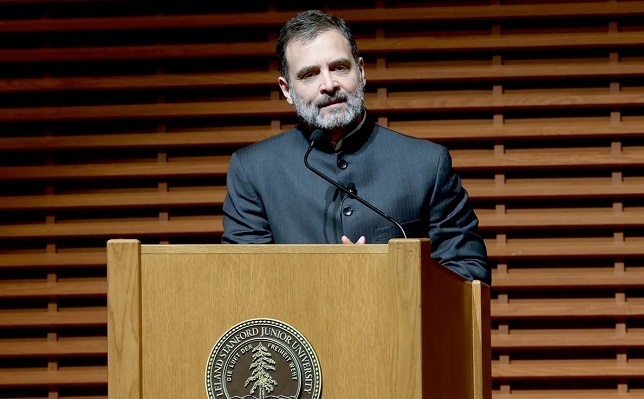Rahul’s comment on Muslims and on Muslim League leave yet another trail of controversy abroad.
Controversy continues to dog Rahul Gandhi during his sojourns abroad. His remarks on India in
the UK in February led to BJP stalling Parliament as the MPs felt that India had been belittled.
Opposition lost the opportunity of scrutinising the Government in the crucial Budget
Session—the Budget was passed sans discussion due to disruption from both sides. During his
current visit to the US, coming as it does on the eve of Prime Minister’s state visit to that
country, one would have expected the leader of India’s oldest party to be circumspect. His
remarks on India’s democracy and state of the economy painted a grim picture. Some of his
remarks even betrayed his lack of appreciation of history.
Rahul Gandhi’s visit to the US, which began Thursday last, was marked by crosscurrents. As
expected, he berated the Narendra Modi regime while addressing reasonably well attended
meetings organised by his party’s overseas wing, headed by Sam Pitroda. (His meetings were
held in large auditoriums, not in open parks or stadia as is the case with Narendra Modi during
his visits abroad since 2014.) His assessment of India apparently was not shared either by US
lawmakers or even by economic analysts. While Rahul was in the American shores the United
States Congress took a bipartisan (supported by ruling Republicans as well as Democrats)
decision to accord Narendra Modi an honour which hitherto had been extended to Winston
Churchill and Nelson Mandela—of being invited to address the Joint Session of apex US
legislature for a second time during his nine-year tenure. Jawaharlal Nehru, who was PM for 17
years, was invited once. Four other Indian PMs, Rajiv Gandhi, P.V. Narasimha Rao, Atal Bihari
Vajpayee and Manmohan Singh, had been accorded the honour once each. Modi, who had
addressed the US Congress in 2016, will be doing the honours in Washington again on 22
June, a day after he leads the world in observing International Yoga Day at the United Nations
Headquarters in New York.
While Rahul Gandhi was painting a grim picture of Indian economy before his audiences in San
Francisco and Washington, his scepticism was laid bare by a study by Morgan Stanley, which
said India has transformed in less than a decade: “India, under Prime Minister Narendra Modi,
has transformed, gaining a position in the world order and becoming a key driver for Asia and
global growth.” Noting that there is significant scepticism about India, particularly with overseas
investors, Morgan Stanley said that the sceptics have an ostrich-like attitude, turning a blind eye
to the significant changes that have taken place in India, especially since 2014. India of today,
the report said, “is different from what it was in 2013. In a short span, India has gained positions
in the world order with significant positive consequences for the macro and market outlook.”
At San Francisco, while answering a representative of the Bay Area Muslim community Rahul
shot himself in the foot—he perhaps unconsciously ran down the regimes of Indira Gandhi and
Rajiv Gandhi when he said that the condition of Muslims in India now was akin to that of Dalits
during the decade of the 1980s. Between 1980-89 India had uninterrupted Congress rule, the
last tenure of the Grand Old Party as the ruling party ( it returned to power later, thanks to
coalition support). His behaviour was reminiscent of his February remark in Cambridge when he
told a Sikh gentleman that Sikhs were now being treated as “second class citizens”. As
opposition leader Rahul is entitled to air views contrarian to the official stand—but does that give
him carte blanche to run down the nation on assumptions which may not withstand a litmus
test?
In Washington, while addressing the National Press Club (NPC), Rahul rightfully taunted his
lineage—he was the fourth generation of a family which had been invited by the prestigious
body—Jawaharlal Nehru, Indira Gandhi and Rajiv Gandhi having been guests of the NPC in
their times. However, unlike his esteemed predecessors he committed a gaffe. Answering a
question on the alliance between Indian National Congress and the Indian Union Muslim
League (IUML)—a state party of Kerala—he said that the League was “completely secular”.
Secularism and Muslim League are antonyms per se. Communal divide began with the
formation of Muslim League in 1906. Hindu Mahasabha was formed in 1923. Rashtriya
Swayamsevak Sangh was born in 1925. In 1916, Congress signed the Lucknow Pact with the
League, which established separate electorates for Hindus and Muslims—the seeds of partition
were sown. IUML was the residue of the party which partitioned India in 1947—in 1948 the
members of Mohammad Ali Jinnah-led party, who had not crossed over to Pakistan and
decided to be Indian nationals, had formed the party. IUML initially was an ally of the
Communist-led Left Front and since 1976 has been part of Congress-led United Democratic
Front in Kerala. Rahul Gandhi’s victory from Wayanad in 2019 was attributed to IUML support.
In 1948 Jawaharlal Nehru had called IUML a “quisling”. This assessment has been overlooked
since 1976 since when Muslim League has been an important ally of Congress in Kerala .
Rahul Gandhi was described by his host at the Washington DC National Press Club as the “
most important opposition politician in India”. Being the “High Command” of Congress even
under Mallikarjun Kharge’s dispensation, Rahul is entitled to be described thus. A sense of
history may do him some good.

